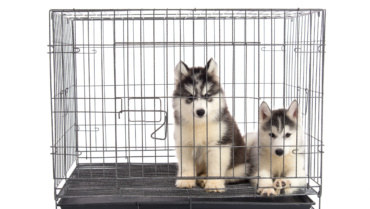Puppies are undoubtedly adorable, but they also require a lot of attention and care to grow up healthy and happy. One of the most crucial aspects of caring for your furry friend is feeding them properly.
However, with so much information out there, it’s easy to make mistakes that can harm your puppy’s health in the long run. That’s why we’ve gathered tips from veterinarians on how to avoid common puppy feeding mistakes and ensure that your pup gets all the nutrients they need to thrive!
Introduction
As a new puppy owner, you may be feeling overwhelmed with all of the information out there on how to properly care for your pup. When it comes to feeding, there are a lot of common mistakes that new owners make.
To help you avoid making these same mistakes, we’ve gathered some tips from veterinarians on what to do (and what not to do) when it comes to feeding your puppy. One of the most common mistakes new puppy owners make is overfeeding.
Puppies need less food than you might think, and they should only be fed two or three times a day. It’s important to measure out their food so you’re not accidentally giving them too much. Another mistake is not paying attention to the ingredients in their food. Just like with people food, some ingredients are better for puppies than others.
Make sure you’re reading the labels and choosing a food that has high-quality ingredients. Another common mistake is not switching your puppy’s food gradually. If you’re going to switch brands or formulas, do it slowly over the course of a week or so to give their tummies time to adjust. And finally, don’t forget about water!
Puppies need plenty of fresh water available at all times, especially if they’re eating dry food. By following these tips from veterinarians, you can avoid making common feeding mistakes and help your puppy grow up healthy and happy!
Types of Puppy Feeds and What to Look For
There are a variety of types of puppy feeds available on the market, and it can be confusing to know which one is right for your pup. Here are some tips from veterinarians on what to look for in a puppy feed, and what common mistakes to avoid:
Puppy Feeds: -Look for a puppy feed that is specifically designed for puppies. Puppy formulas contain higher levels of protein and fat to support growth and development.
-Avoid feeds that contain fillers such as corn or soy. These ingredients can cause gastrointestinal upset in puppies.
-Choose a feed that is easy to digest. Puppies have sensitive stomachs, so look for a formula that contains easily digestible ingredients like rice or oats.
Common Puppy Feeding Mistakes: -Overfeeding: It’s important not to overfeed your puppy as this can lead to obesity and other health problems later in life. Stick to the recommended amount on the feed bag, and don’t be tempted to give your pup extra treats!
-Underfeeding: Just as you shouldn’t overfeed your puppy, you also don’t want to underfeed them. This can stunt their growth and development. Make sure you are feeding them enough to support their needs.
How Much Should You Feed Your Puppy?
Puppies need to eat more often than adult dogs. They should be fed three to four times a day. The amount of food will depend on the puppy’s age, breed, and activity level. A general rule of thumb is to feed puppies 1/2 to 1 cup of food per meal.
This can be divided into smaller meals or fed all at once. It’s important to monitor your puppy’s weight and adjust the amount of food accordingly. Puppies should gain about 5% of their body weight each week. Puppies also need access to fresh water at all times.
How much water they drink will depend on how much food they’re eating and their activity level. It’s important not to over or underfeed your puppy as this can lead to health problems down the road. If you have any concerns about your puppy’s diet, please consult with your veterinarian.
Common Mistakes to Avoid When Feeding Your Puppy
When it comes to feeding your puppy, there are a few common mistakes that you’ll want to avoid. Here are some tips from veterinarians on how to do just that:
1. Overfeeding. It’s important not to overfeed your puppy as this can lead to obesity and other health problems down the road. Stick to the recommended amount of food for your pup’s age and size.
2. Underfeeding. On the flip side, you also don’t want to underfeed your puppy as this can stunt their growth and development. Again, follow the recommended amount of food for your pup’s age and size.
3. Feeding table scraps. Table scraps are often unhealthy for puppies and can cause them to become picky eaters later on in life. Stick to a healthy, well-balanced diet for your pup instead.
4. Not cleaning up after meals. It’s important to clean up any spilled food or water after your puppy has eaten their meal. Leaving food out can attract pests like rodents or bugs, and can also create a slip hazard for you or your family members.
5. Not providing fresh water at all times. Fresh, clean water is essential for puppies (and all pets!). Make sure they always have access to fresh water, and change it out daily if possible.
Nutritional Benefits of Different Foods for Puppies
Puppies require a high-quality diet that meets their nutritional needs for growth and development. Puppies need more calories, fat, and protein than adult dogs, as well as certain vitamins and minerals to support their growing bodies. While you may be tempted to feed your puppy human foods, it’s important to avoid common puppy feeding mistakes and give them the right nutrition for a healthy start in life.
One of the most important nutritional benefits of different foods for puppies is that they help support proper growth and development. For example, puppies need more calories than adult dogs to support their rapid growth.
Fat is also an important part of a puppy’s diet because it provides energy and essential fatty acids for proper development. Protein is essential for muscle growth and repair, as well as supporting the immune system. Puppies also need certain vitamins and minerals, such as calcium for strong bones and teeth, to support their growing bodies.
While there are many different types of food that can provide these nutrients, it’s important to consult with your veterinarian to choose the best food for your puppy based on their individual needs. Avoiding common puppy feeding mistakes, such as overfeeding or underfeeding, will help ensure that your puppy grows up healthy and happy!
Tips from Veterinarians on Proper Feeding Habits
As a new puppy owner, it’s important to learn about proper feeding habits from the start. Here are some tips from veterinarians on how to feed your pup:
1. Avoid overfeeding. It’s common for new puppy owners to overfeed their pets, but this can lead to health problems down the road. Stick to the recommended portion size for your pup’s age and breed.
2. Choose the right food. Not all dog foods are created equal. Talk to your veterinarian about which type of food is best for your pup based on their individual needs.
3. Avoid table scraps. It may be tempting to give your pup table scraps, but this can actually lead to nutritional deficiencies and other health problems. Stick to their regular dog food diet and save the scraps for yourself!
4. Be consistent with feeding times. Puppies need consistency when it comes to feeding times. Set a regular schedule and stick to it as much as possible so that your pup knows when to expect their next meal.
Conclusion
Feeding your puppy correctly is essential for its long-term health and well-being. By following these tips from veterinarians, you can ensure that your puppy is getting the nutrition it needs to grow strong and healthy.
Remember to feed them a balanced diet of high-quality food that contains all the vitamins and minerals they need, provide plenty of fresh water, avoid overfeeding them treats or table scraps, monitor their weight regularly, and consult with your veterinarian if you ever have any concerns about their dietary needs.
With proper feeding practices in place early on in life, you can help set up your pup for success later down the road!





Add Comment